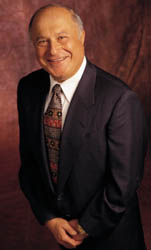| |
Early Experiences
Make for Lasting Impressions
Through his Life Planning Week initiative, State Bar President
Leonard Loeb hopes to inspire the general public to view attorneys
in a positive way - as he himself was inspired as a young
child. Early impressions of lawyers and the law influenced Loeb's
career choice.
By Dianne Molvig
 Leonard Loeb's first impressions
of the law profession date back more than six decades, when he
was about six years old. His father, an immigrant who eventually
started a scrap yard business in Columbus, Wis., regularly sought
legal help in running his business. "I remember my dad had
a tremendous respect for his lawyer, a guy by the name of Cal
Callahan," Loeb recalls. "I always thought lawyers
were 10 feet tall from the way my dad talked about them." Leonard Loeb's first impressions
of the law profession date back more than six decades, when he
was about six years old. His father, an immigrant who eventually
started a scrap yard business in Columbus, Wis., regularly sought
legal help in running his business. "I remember my dad had
a tremendous respect for his lawyer, a guy by the name of Cal
Callahan," Loeb recalls. "I always thought lawyers
were 10 feet tall from the way my dad talked about them."
That image stuck with Loeb all through his youth, plus he
was enchanted by stories he read about Abraham Lincoln's
prowess as a lawyer. By the time Loeb reached high school, he
was certain he wanted to pursue a law career. He graduated from
the U.W. Law School and served a stint of active duty with the
Judge Advocates General Division of the U.S. Air Force during
the Korean War. Then he returned to his home state to take his
first private practice job in the firm of Milwaukee attorney
Ray McCann, whom Loeb describes as "my foster father in
the practice of law." McCann also happened to be an old
friend of Callahan, Loeb's father's lawyer.
Life Planning Week
Now that he's State Bar president, one of Loeb's
top priorities is to inspire the general public to view attorneys
in a positive way - not as the superhumans they were in
the eyes of a 6-year-old boy, but as professionals garnering
respect.
"Lawyers today don't have the greatest public image,"
he notes, "as a result of newspaper articles, some sensational
trials, some terrible jokes, and maybe a little envy. Yet survey
after survey shows that although the public views lawyers as
a group as a little less than admirable, people will say, 'But
my lawyer is a good lawyer and a good individual.' But the
vast majority of people do not have lawyers. They only come across
lawyers in the media. So I thought, in what way could people
meet and get to know an individual lawyer?"
Pondering that question led Loeb to develop one of the key
initiatives he'll enact during his tenure as president -
an idea that has evolved, through consultation with other attorneys
and the State Bar staff, into an event called Life Planning Week,
to be publicized and held in conjunction with Law Day in May
2000.
|
Why should we have the reputation of
being 'hired guns,' as compared to being hired to be
problem solvers? Our best function is to solve problems. That's
what we're best suited and equipped to do." |
"I thought, what is it that every human being in Wisconsin
over the age of 18 should have that a lawyer can provide? The
idea struck me: Everyone over 18 should have a living will and
a medical power of attorney. And these should be done when it's
not a crisis," Loeb explains. Thus, during Life Planning
Week, the State Bar, with help from the State Medical Society,
will educate citizens across the state about preparing necessary
documents. As Loeb sees it, this activity will serve dual purposes.
"It's a public service," he notes. "And it's
a massive effort to show lawyers in their best light."
Rules of Negotiation
Not only can the public's image of lawyers stand some
polishing, but relations among lawyers themselves could improve,
Loeb says. Another of his presidential initiatives will address
one aspect of that issue, by developing rules for negotiation.
"Everybody has his or her own style of negotiation,"
Loeb points out, "but there are no rules." He feels
there should be, just as there are rules of evidence, for instance,
that apply to trying a case. Rules for negotiation could help
avert the games lawyers sometimes play with each other, he contends.
"Unfortunately, a lot of lawyers don't want to negotiate,"
Loeb says. "Some give ultimatums. They'll say they
have to have an answer by 5 p.m. on Friday or an offer will be
withdrawn. Well, my nature doesn't do well with ultimatums.
So I'll say, 'Gee, can I have till 5:30?' An ultimatum
is the first sign of insecurity. Giving good lawyers ultimatums
is counterproductive."
Next Page
|
